THE HINDU – CURRENT NOTE 04 February
 A 21st century find spotlights prehistoric rock art
A 21st century find spotlights prehistoric rock art
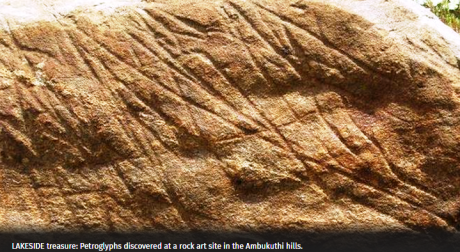
- Some 123 years after British police officer Fred Fawcett’s chance discovery of the world-famous Edakkal Caves and their Neolithicpetroglyphs (rock carvings), an equally important prehistoric rock art site has been spotted in the foothills of the Ambukuthi hills — in the same village located in Sulthan Bathery taluk of Kerala’s Wayanad district.
- The site has been discovered by independent researcher, writer and national award-winning filmmaker O.K. Johnny, whose efforts had earlier attracted leading historians and archaeologists to the Edakkal Caves.
- “It is likely that the same artists who created the engravings in Ambukuthy and their descendants created the petroglyphs in Thovari and Edakkal,” he says.
- “The Ambukuthi valley engravings are seen on six small rocks located on a lakeside, and they have a striking similarity to theThovari carvings — in their style, motifs and workmanship.
- Both in Thovari and in the Ambukuthi valley, there are no human or animal figures in motion as seen in the Edakkal caves.
- Like in Thovari, Ambukuthi valley engravings are abstract and made of thick long lines,” Mr. Johnny explains.
- Eminent historian M.R. Raghava Varier, who attempted to analyse Thovari signs in the eighties and found some surprising similarities with Indus motifs, said that the Ambukuthi valley engravings would inform future studies of rock art culture in south India.
 ‘17.3 lakh new cancer cases by 2020’
‘17.3 lakh new cancer cases by 2020’
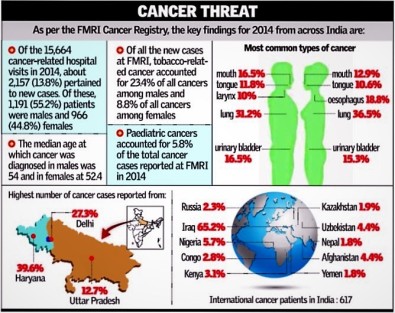
- According to The Indian Council of Medical Research (ICMR), India will see 17.3 lakh new cases of cancer — with breast, cervix and lung cancer being the most prominent — by 2020.
- The ICMR launched the National Cancer Registry Program (NCRP) to establish an agewise and gender-based demographic profile of cancer patients.
- However, challenges exist in the availability of updated data for the public and stakeholders.
- Dr. Vinod Raina, executive director, FMRI said: “Non-communicable diseases account for 53% deaths in India, of which 6% are cancer deaths. The purpose of a cancer registry programme is to collect data as per age, gender, geographical distributions, type of cancer, site of cancer, grading and staging of cancer (to evaluate degree of invasion and metastasis), management, morbidity and mortality.
- Such a database is critical for yearly mapping of prevalence, future planning of resources, assessment of preventive measures and charting disease trends.”
 Chenchu tribals get an ATM for medicines
Chenchu tribals get an ATM for medicines
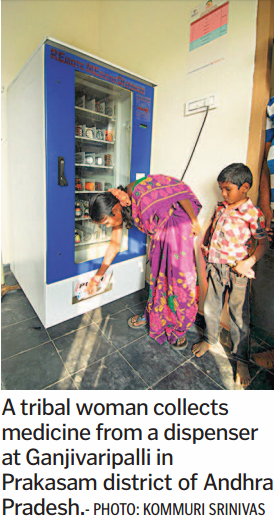
- Emergency medical care has been a far cry for the tribals of remote ‘Chenchugudems’ (habitation of Chenchus , the particularly vulnerable tribal people) of Prakasam district in Andhra Pradesh because of the difficult terrain and lack of communication network.
- The State government has now set up an ATM-like kiosk to dispense medicines free of cost round-the-clock at the Ganjivaripalli village, near Yerragondapelem on the Nallamala foothills.
- All that the patients visiting the sub-centre attached to the Palutla Penta Primary Health Centre have to do is call on a local health worker, who will be available 24×7, says J. Yasmin, Medical and Health Officer, Prakasam.
- After checking the blood pressure and pulse of the patient, the health worker will arrange for a mobile phone conversation with a medical officer — even at odd times — and brief him or her about the patient’s health condition.
- The officer will evaluate the patient’s health condition before sending an SMS to the Remote Medicine Dispenser (RMD), which will then dispense the appropriate medicine quickly.
- The RMD has been loaded with different sets of medicine in the 36 slots available, and a number has been given to each of them.
- The RMD dispenses the relevant medicine when the appropriate number is pressed.
 UIDAI clamps down on 50 fraud sites offering Aadhaar services
UIDAI clamps down on 50 fraud sites offering Aadhaar services
- In a crackdown on unauthorised agencies offering Aadhaar-related services – such as downloading online Aadhaar card, providing status of Aadhaar generation and PVC Aadhaar card – illegally and charging excessive money from the public, the Unique Identification Authority of India (UIDAI) has shut down 12 such websites and 12 mobile applications available on Google Play.
- At present, any Aadhaar related demographic information can only be shared as per the procedures laid down in the Aadhaar Act.
- Any violation is punishable under Section 38 and Chapter VII of the Aadhaar (Targeted delivery of financial and other subsidies benefits and services) Act 2016
- The UIDAI said these illegal websites and mobile applications were illegally obtaining the Aadhaar number and enrolment details from the residents.
- It also warned websites and mobile applications against the illegal use of Aadhaar logo in violation of the Aadhaar Act and the Copyright Act.
- As per Section 70 of the IT Act, the Government has declared the UIDAIs Central Identities Data Repository (CIDR) facilities, Information assets, logistics infrastructure and dependencies installed at UIDAI locations to be critically protected system.
- http://www.uidai.gov.in is the only authorised website of UIDAI, the statement said adding that for Aadhaar related services, people should visit either the official website or authorised Common Service Centres or Aadhaar Permanent Enrolment Centres.
 SC quota order a setback to Rajasthan
SC quota order a setback to Rajasthan
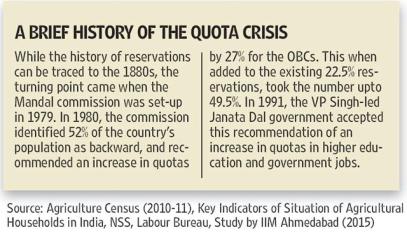
- The Supreme Court’s interim order, for maintenance of status quo in employment and admission to educational institutions for the Special Backward Classes (SBCs), including Gujjars, has come as a setback to the BJP government in Rajasthan.
- While refusing to stay the Rajasthan High Court’s December 9, 2016 judgment, which struck down legislation providing 5% reservation to SBCs, the court directed the State government not to make any fresh admissions and appointments till the final hearing in the matter.
- Passing its interim order on a special leave petition moved by the State government against the High Court’s judgment, a two judge Bench also said the admissions and appointments made so far would not be disturbed.
- The decision to provide the Special Backward Classes (SBCs) reservation was taken on November 28, 2012.
- A separate five per cent quota to the SBCs without touching the 21 per cent reservation available to Other Backward Classes took the overall reservation in jobs and education to 54 per cent in the state.
- It had left the Gujjars dissatisfied as it was susceptible to judicial rejection since its inception.
- An attempt was made earlier in 2008 to grant five per cent reservation to SBCs which was struck down by the High Court in 2009.
 Myanmar Army committed crimes against humanity: UN
Myanmar Army committed crimes against humanity: UN
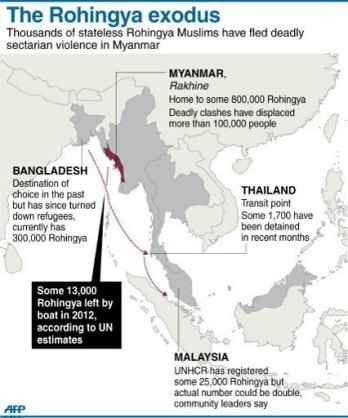
- Myanmar’s security forces have committed mass killings and gang rapes of Rohingya Muslims and burned their villages since October 2016 in a campaign that probably amounts to crimes against humanity and possibly “ethnic cleansing”, the UN human rights office said.
- Witnesses testified to “the killing of babies, toddlers, children, women and elderly; opening fire at people fleeing; burning of entire villages; massive detention; massive and systematic rape and sexual violence; deliberate destruction of food and sources of food”, the report said.
- Around 66,000 people have fled from the Muslim-majority northern part of Rakhine State to Bangladesh since Myanmar’s military launched a security operation in response to attacks on police border posts on Oct. 9, 2016 the UN report said.
- Four U.N. investigators gathered testimony last month from 220 Rohingya victims and witnesses who fled the “lockdown area” in Maungdaw in Rakhine for the Cox’s Bazar district in Bangladesh.
- Nearly half of them reported that a family member had been killed or disappeared while 101 women reported having been raped or subjected to sexual violence, it said.
 Centre spurns Gujarat’s plea to end duty on scrap-ship imports
Centre spurns Gujarat’s plea to end duty on scrap-ship imports
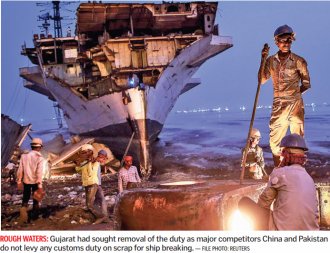
- The Centre has rejected a demand from Gujarat, which leads in ship recycling, to give an impetus to the sector by abolishing the 2.5% Basic Customs Duty (BCD) levied on ships imported for scrap.
- The state government’s proposal was turned down by the Centre saying such a move will, among other things, harm primary manufacturers of iron and steel because items obtained from the scrap generated from breaking up of ships will compete with the products manufactured by them.
- According to the state government, the 2.5% BCD — levied on vessels and other floating structures for breaking up — needs to be eliminated as India’s major ship breaking industry competitors such as China and Pakistan do not impose any customs duty on scrap for ship breaking industries.
Role played by ship recycling industry in India:
- India accounted for around 35% share globally in 2014 in ship recycling — the main method of disposal of old ships — in terms of tonnage of ship.
- Within India, Gujarat is the leader in the labour-intensive segment as over 90% of ship recycling in India takes place at Alang-Sosiya Ship Recycling Yard.
- The yard, developed by the Gujarat Maritime Board in 1982, provides direct and indirect employment to over 1.5 lakh people.
- So far, the yard has helped recycle more than 7,000 vessels and generate 54 million LDT (Light Displacement Tonnage) steel, the Gujarat government said.
- It added that the ship recycling sector fulfils about 2% of the country’s steel demand, besides saving substantial amount of natural resources (as it helps reduce the need for iron ore mining), foreign currency requirement (as it leads to a decrease in imports of iron ore and steel) and reduction in the carbon footprint.
Factors that hurt the ship recycling industry
- The State said the factors that hurt the ship recycling industry include rupee depreciation and high volatility against the U.S. dollar leading to ship breakers postponing their purchases (imports of old ships), lower increase in steel prices in India as well as competition from countries such as China, Pakistan and Bangladesh.
 Single-dose Zika vaccine works well in animals
Single-dose Zika vaccine works well in animals
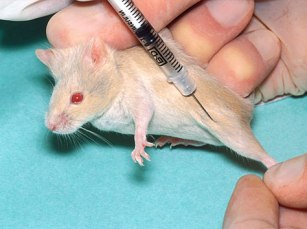
- An innovative vaccine made from genetic material protected lab animals from the Zika virus in experiments, scientists reported, calling it a “promising” lead in fighting the threat to humans.
- A single, low dose of the vaccine shielded mice exposed to Zika five months after the shot, they reported in the journal Nature.
- Monkeys exposed five weeks after they were innoculated were also not affected by the virus.
- Zika erupted on a large scale in mid-2015 and more than 1.5 million people have been infected.

